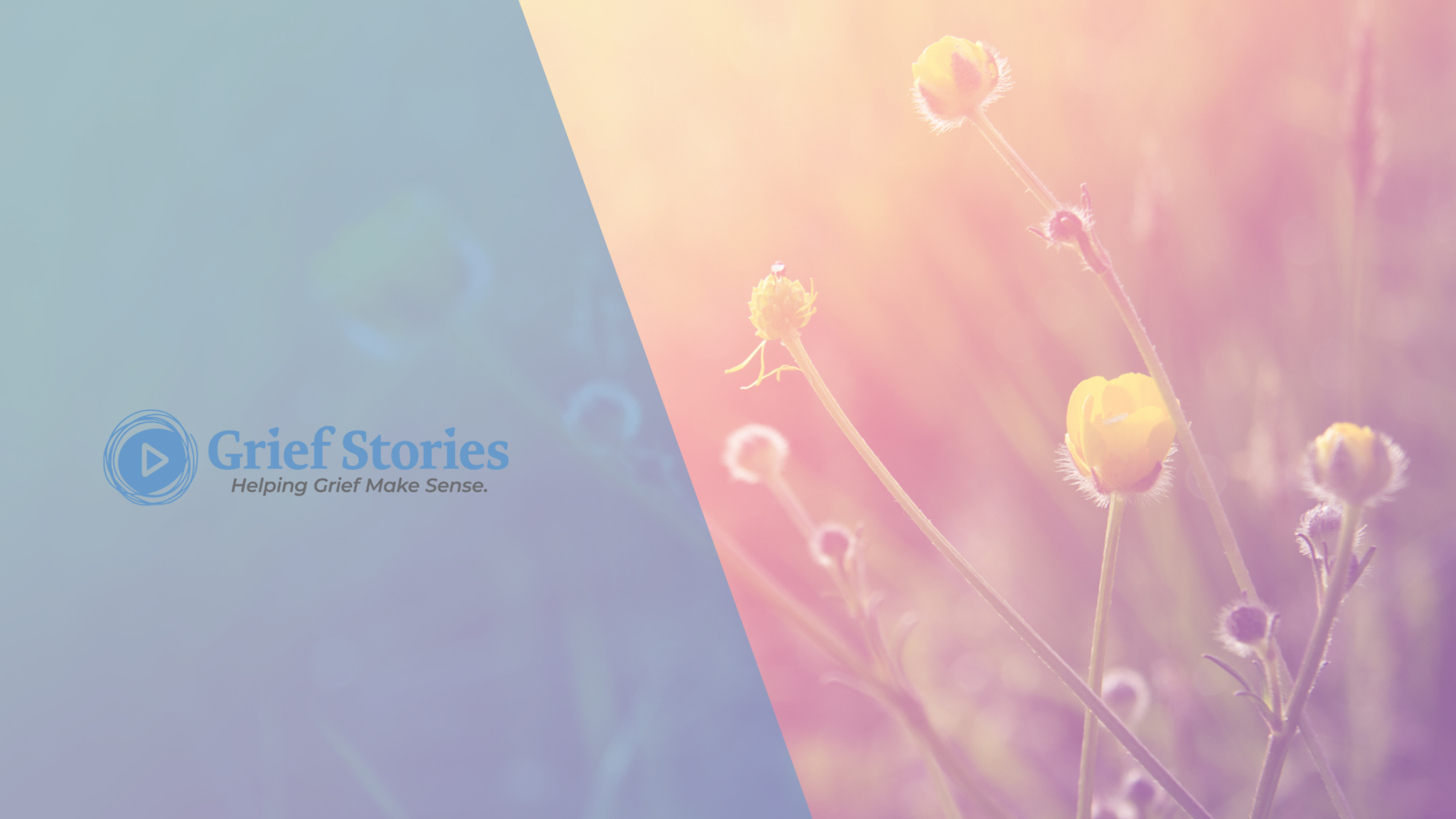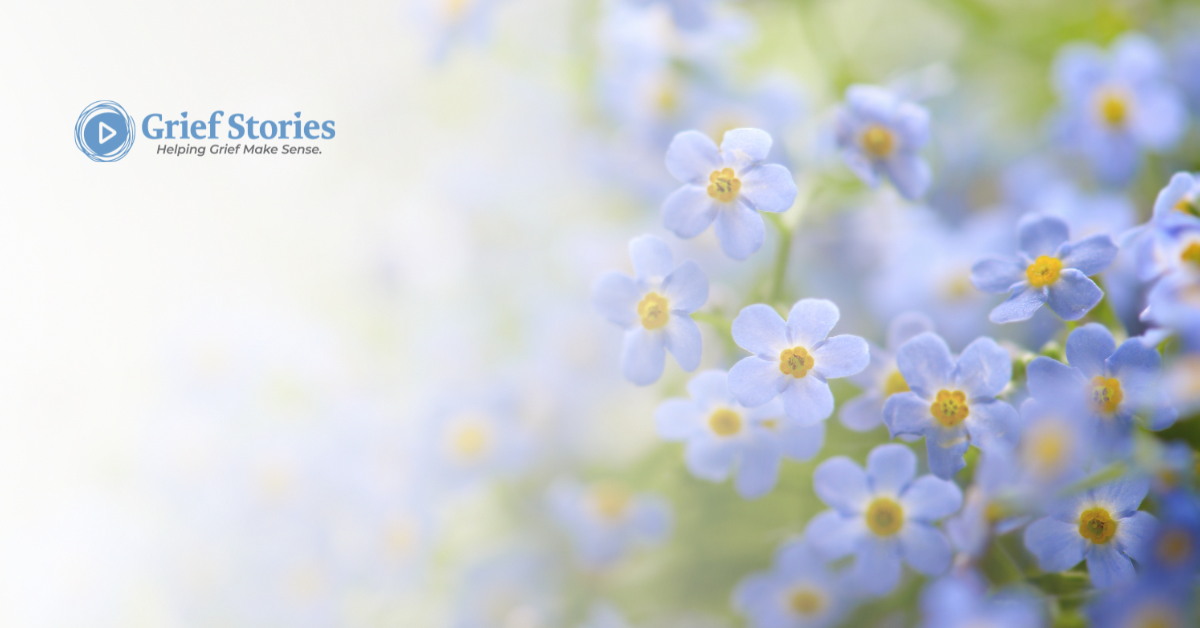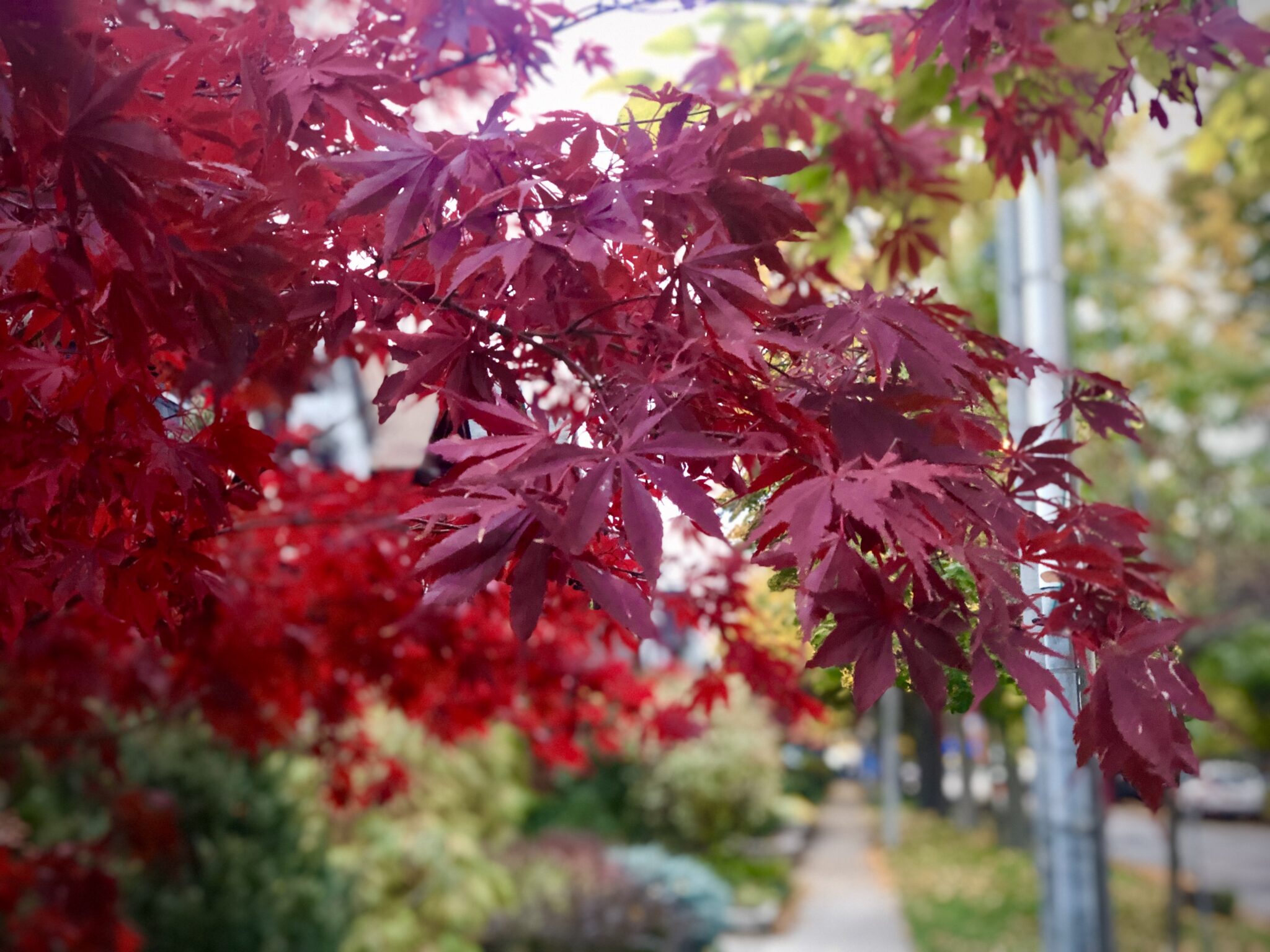Posts Tagged ‘Love’
Preparing For and Coping with Special Days
Special Days can be days we have honoured with our loved ones that many others celebrate or more personal dates and milestones with your loved one. As these days approach, it can be difficult to figure out how to move through a Special Day. Do you do what you’ve always done? What do you do if you just want to ignore the day? Special Days can bring up a lot of different emotions, triggers, and opportunities to honour the person who has died.
Why Can Special Days Feel so Hard?
While we are grieving, it can feel as if our world has stopped while the rest of the world seems so happy and carry on as if nothing has happened. After the death of a loved one, there are other transitions and losses we can be grieving while we grieve the death. We may be letting go of old roles while taking on new roles in our family. There may be changes in our relationships and dynamics with others.
Planning Ahead Can Help Us Prepare
There’s no “right” way to feel as a Special Day approaches. You may dread the event, feel on edge, be angry at the number of store displays triggering your grief, or find yourself honouring your loved one and feeling joy.
Planning can help lower anxiety and can help us feel more prepared to cope. Grief can change from moment to moment. If your plans need to change the day of, that’s okay too.
Involve your support network that you usually spend this time with, including children, in conversations about what they would like to do. Everyone is impacted by grief, no matter their age, ability, gender, race, or other identities. You can find more information on grief and supporting grievers with intellectual disabilities here and a post about supporting grieving children here.
Taking Care of Yourselves Through and After Special Days
You may find that your grief is heavier in the lead-up to the Special Day, on the Special Day itself, or that you may experience a wave of grief in the day(s) afterwards.
Here are some gentle reminders:
- You may not be able to do all the things you have done or had planned to do, but be compassionate with yourself. You are allowed to set boundaries around your capacity so you can give yourself plenty of care and rest during this time.
- Grief can impact us mentally, emotionally, and physically. We can find ourselves exhausted in different ways, especially after going through heavy days. Check out our tips on the different ways we can give ourselves rest and care as we grieve here.
- This time of year can have us grievers feeling more overwhelmed or lonely at this time of year. If it feels right, think about it and reach out to people in your network you find supportive. Asking for specific support helps our loved ones give us what we need. The 3 H’s can help us name what type of support we may be needing:
- Heard: To feel listened to, validated, without judgement
- Help: Problem-solving, practical support like cooking, cleaning, childcare, etc.
- Hug: Sometimes we don’t need words of comfort, but a comforting touch like a hug.
- There is no right way to feel on a Special Day. You are allowed to experience moments of joy and lightness on these days while also missing your loved one.
____________________________________________________________________________________
Jessica Milette, MSW, RSW. Grief Stories Healthcare Consultant
Jessica is a registered social worker and owner and of Cultivating Connections. Her expertise includes helping individuals and families facing anticipatory grief, ambiguous loss, disenfranchised losses, and sudden deaths. Jessica believes in the power of connection; within ourselves, with those who have died, those we are in relationship with, and with our greater communities. Through sharing our stories of grief and loss, we tend to our connection with those who have died and creating connections with others.
Jessica is a white woman living on the traditional territory of the Anishnabek, the Haudenosaunee, the Attiwonderonk, and the Mississaugas of the Credit peoples, also known as Guelph, ON.
Finding Joy During the Holidays After Loss When Everything Feels Awful: A message of hope.
My mother died in the middle of the night on January 1, four days before I turned sixteen. I don’t remember much about Christmas the couple weeks before she died, just that we spent a lot of that season in the ICU of the hospital where my mother had birthed my brother and I. For a decade after she died, I hated Christmas. Everything filled me with dread and heaviness. The lights, decorations, and music made my skin crawl- and they were inescapable. At the grocery store, at work, looking out my apartment window onto the main street of a small town. The traditions my family had grown up with weren’t things we did anymore. The holidays weren’t joyful, connective, or fun.
Now, I am thirty-three and the mother of two little humans. I have officially crossed the threshold of being alive longer without my mother than with her. My motherhood has come with many gifts and one of them has been finding joy during the holidays again. I’m writing this cozied in a bright red snoopy sweater that says “merry”. My partner and brother have matching ones. My older kid told me he wants to decorate our house with rainbow-coloured lights, so I bought a strand to hang on the weekend and a small wreath with red berries that reminded me of my mother. I hung the wreath on my front door and thought about how she probably would have hung the lights with my son the same day he had the idea if she were alive.
Last month, my cousin got married and had set up a table of pictures of family members who had died so they could be part of the big day. My beautiful mother was there, smiling brightly out of the frame. My kid noticed it, we have the same picture of her on our fridge. “It’s your mama! She died. We could bring her back and visit her at her house,” said my sweet four-year old. I remind him that death doesn’t work that way, but she lives in our hearts. The next day, he brought her up again and I told him a story about her. It doesn’t feel heavy, even though I still miss her. I feel grateful to feel her presence in our lives. Grief, though still present, changes over time.
If you are someone who is grieving during the holidays and can relate to the first part of my story, I want you to know that it might not feel that way forever. I also want you to know it’s okay to feel however you’re feeling- there are no rules in grief. Here are a few things I’ve learned about grief and the holidays:
Sometimes it can help to make new traditions.
When my older kid was old enough to enjoy Christmas for the first time, I asked my partner, my brother, and other family members if they had any traditions they wanted to start incorporating into the season. We’re still working on building these traditions with my kids, but things like Christmas Eve dinner with my aunt and uncle, Christmas morning with my dad, not wrapping Santa gifts, baking cookies, and hanging rainbow-coloured lights are all slowly becoming ways to find joy, intentionally, together.
- Don’t overextend yourself.
If you don’t want to participate in every (or any) holiday activity- don’t! I didn’t decorate for years, I still avoid malls between November 15-January 1, and there have been some years where I intentionally scheduled work things so I didn’t have to participate at all. It’s okay to be gentle with yourself when it comes to participating in holiday-related things while you’re grieving.
3. Giving can be healing.
I do a lot of my planned giving to charity during the holiday season. I use affiliate programs connected to a breastfeeding support organization I’m passionate about to buy gifts for family and friends, I make donations to organizations that are important to loved ones in their names, and I give to grief resources and hospices as I can. Knowing I am helping other people during a season that has traditionally been hard for me helps me feel connected and supports my continuous healing.
If you find support through the resources we create at Grief Stories, please consider helping us reach our fundraising goal this holiday season so we can continue to produce and distribute free grief resources. Giving is grief support. You can donate here.
___________________________________________________________________________________________
Alyssa Warmland is an interdisciplinary artist and activist. Her work utilizes elements of radical vulnerability, restorative justice, mindfulness, compassion, performance, and direct action.
She is a mother, La Leche League Leader, Board member of La Leche League Canada, writer, podcaster, producer, director, performer, content creator, not-for-profit administrator, and abstract visual artist. Lyss is a strong advocate for fumbling towards an ethic of care, especially when it comes to the topics of birth, matresence, and grief. Most of all, she’s interested in the way people choose to tell their stories and how that keeps them well.
Who are we to Decide? The Many Paths through Grief
A lot of my work with clients involves hearing their stories, but also answering many questions about if their grief is “normal”. Their grief is overwhelming, and our dominant culture’s strong message is – that grief should be kept at its edges, I often find this pervasive intention creeps into griever’s experiences – and my worldview at times. I even catch myself apologizing for crying in public spaces, shutting down my process. There are many ways of doing, being, and knowing, which I continue to learn through the spaces I hold with others.
A Ghanaian woman living in Canada shared with me her experiences after the death of her mother who died in their home country of Ghana. Traditionally, when someone dies in their community, their body is laid in the home and the entire community is welcomed. Feasts, songs, stories, cries, wails. Their world stops – and for longer than a mere few hours. Loud, open expressions of grief are honoured and welcomed.
A Chinese woman expressed worry that something was wrong with them. After attending a grief support group, she felt worse rather than better. So many people have shared how helpful these spaces had been for them, but this wasn’t her experience at all.
A White man sits across from me and tells me his wife encouraged him to try therapy because “he isn’t grieving” since he doesn’t openly share his emotions. One finds comfort in storytelling, talking about the loss of their child, and finds crying cathartic. He speaks about the qualities and memories of their child, practical matters over emotional ones, and their passion for bringing forth advocacy and change concerning the drug poisoning epidemic.
An Indigenous woman speaks about a ritual in their community where the grieving family cuts their hair after a loved one’s death. On one hand, they feel guilt at times for not engaging with it because it “makes it real”. However, getting a tattoo of a flower they got after their mother’s death was their ritual.
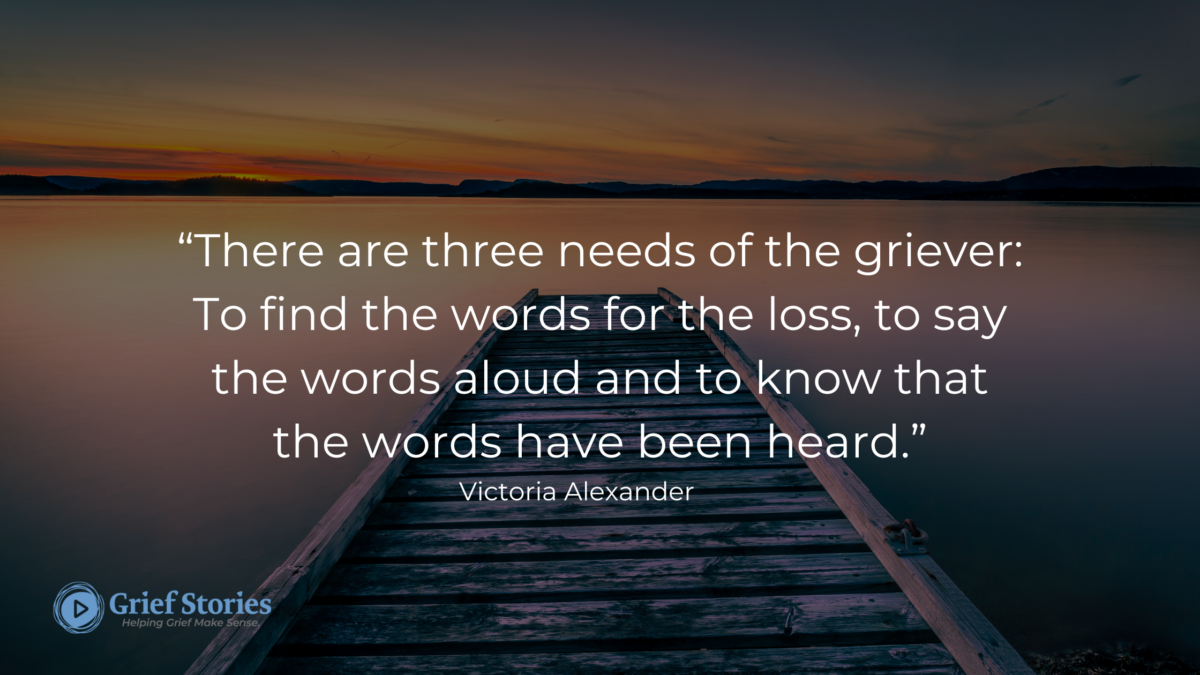
In North America, we are quick to try to “fix” or “solve” grief. There are many books, support groups, and online communities about grief. Yet I have had more than a handful of clients who have recently experienced a death share how their doctor offered them a psychopharmacological medication before their doctor may even acknowledge their loss. I think about the Ghanaian woman, and how open and welcome grief is within their local community. I can only imagine how stifling tending to these rituals in North America may have felt to this person if their mother died in Canada.
There is no “magic pill” to prescribe, but I know many people in the depths of their grief wish there were something, anything to “fast forward” through the sleepless nights, waves of emotion, and grief bursts to a place where their grief feels less overwhelming. There is no right or wrong way to grieve, only yours.
Here are some gentle prompts for you to explore some ways to tend to your grief:
What brings meaning or comfort, to you?
Are there particular rituals your community (spiritual, ethnic, other identities) find important to help honour your loved one?
Which rituals do you find comforting but at times find it difficult to share with others?
Just because White colonizer culture is dominant in North America, does not mean those perspectives are “the right way” through grief and loss. There are many ways of being, doing and knowing in life and in grief.
___________________________________________________________________________________________________________
By Jessica Milette, MSW, RSW . Grief Stories Healthcare Consultant
Jessica is a registered social worker and owner and of Cultivating Connections. Her expertise includes helping individuals and families facing anticipatory grief, ambiguous loss, disenfranchised losses, and sudden deaths. Jessica believes in the power of connection; within ourselves, with those who have died, those we are in relationship with, and with our greater communities. Through sharing our stories of grief and loss, we tend to our connection with those who have died and creating connections with others.
Jessica is a white woman living on the traditional territory of the Anishnabek, the Haudenosaunee, the Attiwonderonk, and the Mississaugas of the Credit peoples, also known as Guelph, ON.
Creating Mother’s Day Traditions as a member of the Dead Mom Club
About a week after Easter this year, I noticed I was starting to feel off. My sleep wasn’t as restful, experiencing tension in my body, at times I was getting irritated with the simplest things. Then while streaming an episode of television, 4 ads back to back all talking about Mother’s Day. Then came the promotional emails, the store displays, and even a banner at the top of my Microsoft Word app directing users to their Mother’s Day templates.
Each year, my relationship with Mother’s Day has changed and it will likely continue to transform for the rest of my life. Early in my grief, I avoided any reminders. It was so difficult to work my part-time job in high school with Mother’s Day displays all around me, hearing about patrons’ plans, and then being asked how my own family would celebrate. I would feel my grief weigh heavily on my body, wanting to sleep until June 1st if I could. My first few Mother’s Days were about survival mode, and getting through my waves of grief.
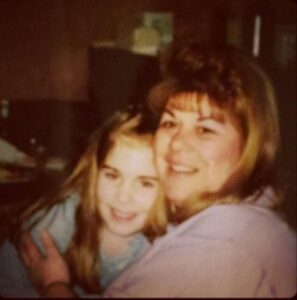
Photo of Jessica and her mother, facing the camera and smiling.
I’m not crushed by my Mother’s Day grief these days in the same way, but I know it is a time of year for me when my grief can show up more. Thoughts about what she would think about streaming platforms; the things I want to tell her; the things I want to thank her for. As my grief has changed these past 18 years, I’ve written letters to my mom, worn pieces of her jewelry, visited her gravesite, bought and written a Mother’s Day card she would have liked, and made some of my favourite childhood recipes of hers.
I would spend many of my Mother’s Days with my grandmother, my mom’s mom as I knew that day held its difficulties for her too. As my grandmother’s health declined over the pandemic, I wasn’t always able or allowed to visit with restrictions. After she died in 2021, I was in a fog by the time Mother’s Day 2022 came around. It felt surreal to me, that on my mother’s side – there are no longer any living maternal presences in my life.
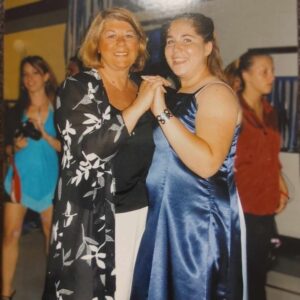
Photo of Jessica wearing a blue satin dress and her mother wearing a long black and
white floral jacket , holding hands as if they are dancing for the camera.
Last year, a friend and another member of the Dead Mom Club were talking about how much this time of year can impact us. These conversations led to something surprising, and beautiful, but also a new tradition that I look forward to engaging in this year. Last Mother’s Day, we had dinner at a nice restaurant downtown, dressed up, and spent an evening talking about our moms. I wore a skirt that belonged to my grandmother and some jewelry that belonged to my mom. My friend also shared items they were wearing or keeping with them that reminded them of their mom. We laughed, we cried, we hugged. It was so cathartic to talk about the things some of our other friends couldn’t quite understand. At times dreading that 2nd Sunday in May, I now know that I can hold space for the difficult emotions that may arise and that I can also look forward to it. To look forward to having dinner with a dear friend, to holding space for the joy, love, and grief we have for our moms, to feel a little less alone on a day that can feel isolating as the rest of the world celebrates it.
_____________________________________________________________________________________________
By Jessica Milette, MSW, RSW . Grief Stories Healthcare Consultant
Jessica is a registered social worker and owner and of Cultivating Connections. Her expertise includes helping individuals and families facing anticipatory grief, ambiguous loss, disenfranchised losses, and sudden deaths. Jessica believes in the power of connection; within ourselves, with those who have died, those we are in relationship with, and with our greater communities. Through sharing our stories of grief and loss, we tend to our connection with those who have died and creating connections with others.
Jessica is a white woman living on the traditional territory of the Anishnabek, the Haudenosaunee, the Attiwonderonk, and the Mississaugas of the Credit peoples, also known as Guelph, ON.
Adam – Story 1
Adam – Story 1
Adam shares about losing his Mom and the many wonderful things he remembers
When Death Feels like a Thief
By Amanda Sebastian-Carrier.
Amanda Sebastian-Carrier is a communications professional who writes about her grief journey as a form of healing.
Thief!
Oh, how loudly I’d yell the words, shaking my fist at its back as it ran from me through the crowded bazaar. You would find me, soaked in tears, panting and crying and trying to explain that something very precious had been taken from me by that, that, THAT THIEF!
In the heart of my grief, at my frailest, all I could see was what was no more. I grieved all that was stolen from me by death; love, security and even my very self. Had I known the value of having every pocket of who I was, picked bare by grief, I would not have fought so hard to hold onto it all. I’d have let that cutpurse have it all without raising an alarm. That egg, it could take the golden globs of joy, the silvery wisps of laughter and the precious stones of delight that once filled my world and sell them all to the highest bidder. How could I have seen the faceless bidder, behind their paddle, was me. Grief, that panderer, was only taking from me what I could not currently carry and would sell it back, piece by piece, as the currency of healing was paid.
If only I’d had a clue that the larceny committed by grief was not the crime I was reporting, I’d have stopped much earlier. Before death, I had no idea that the theft of all you knew and love and the process of reclaiming your sense of security and self were a process that had the ability to change your life forever, but not how you might think. Grief and mourning can lead to healing if you do the work. If you don’t waste time filing reports to the universe about the misappropriation of your loved one. If you immerse yourself in the process of mourning, instead of decrying the looting of your life. If you truly, honestly, and mindfully, say goodbye instead of trying to hold on. If you can do all that, the only thing that grief is able to steal is your pain. You just have to be willing to give it up, let it be taken.
It’s only now, after I have made my peace with the plundering pirates of grief that I can see what I saw as theft, was actually a gift. The thief that is grief was not stealing all that was happy and good in my life, it was stealing my pain. Grief sat on me, taking all the things I didn’t know how to process, and filtered them through different lenses. It sat with me, taking from me each tear that fell, each shaky breath and each battered heartbeat. Grief took all I had, each story, each memory, and each emotion from me until I began to have room to process life again. Grief took, not a life in the way death had, but death; out of the way of life. Death stole life and grief; grief gave it back.
Jean – It’s all about love
Jean – It’s all about love
Jean talks about losing her husband to a heart attack on valentines day
Mary S – Coping with multiple loss
Mary S – Coping with multiple loss
Mary explains the challenges of dealing with the death of her partner and then her parents
Valmy – Music for me and for others
Valmy – Music for me and for others
Valmy talks about music she has created around her loss and how it helps her connect with others
The Unique Wounds of Ambiguous Loss
Post by Maureen Pollard, MSW, RSW
The Unique Wounds of Ambiguous Loss
Ambiguous loss, as it relates to death, happens in two ways.
A loved one may be physically absent, missing and potentially dead, but without definite evidence to confirm a death.
A loved one may be mentally absent due to conditions like dementia or other circumstances near the end of life that make them inaccessible to us even though they are physically still alive.
In either circumstance, family and friends are impacted by the absence of a formal acknowledgement of loss that begins an outward, expected grieving process. Instead, there may be an on-going dance between anticipatory grief, and the possibility of hope.
According to the work of William Worden, the tasks of mourning include a need to accept the reality of death. When you do not have the chance to view a still body, to touch a cheek one more time, and come together with others in a gathering to honour the deceased, it can be difficult to find a way forward. Similarly, when your loved one has good days and seems bright and well, it may be hard to accept the truth of a terminal diagnosis.
In either scenario, it’s common to seek information and it’s unusual to find definite answers. The ambiguity creates a storm of mixed emotions quite different than the experience of other death that is as clear and complete as it is heartbreaking. Denial is a common experience. It can be easier to avoid the facts when the situation is uncertain.
Denial can prevent families and friends from adapting to the situation. The unresolved situation of a missing person can leave people stuck, afraid to move on for fear of letting their loved one down. In the case of a family member becoming absent through such conditions as dementia, or decreasing consciousness, denial may mean that people miss the opportunity to be present, to appreciate the person who is dying and to say a meaningful goodbye. Either way, the wounds of ambiguous loss linger, difficult to heal as the mourner struggles with questions and regret.
Healing through ambiguous loss involves the ability to redefine a relationship with the person in their absence. Sometimes this involves adapting how you think about them and other times it involves actions you take to respond to the difference in how things are now. Once you have gathered as much information about the situation as possible, you can begin to make choices about how you will think and act in relationship to this difficult situation.
There is no one right way to adapt to ambiguous loss. Each person must gather relevant information about their own situation, and then set boundaries that help with adjustment. If you face such circumstances with someone in your life, be sure to hold yourself with deep compassion as you move through these steps and tend to your own needs. It will not always be this way. You can make meaning and find hope through your thoughts and actions in such a way that will allow you to rest as easy as possible even under such circumstances.
When Death is a Natural Part of Your Workplace
Post by Maureen Pollard, MSW, RSW
When Death is a Natural Part of Your Workplace
Staff and volunteers in hospice, long-term care facilities and hospitals know that death is a part of life. You typically witness death on a regular basis as part of your job. As a result, there are some important steps you can take to engage in self care and look after yourself when loss and grief are a part of the emotional landscape in your workplace.
Consider your personal experience of loss.
Self awareness is helpful as we reflect on events in our life, our personality and our actions. Think about family and friends who have died. Reflect on your grief. How did you feel? What did you do to honour the loss? Was there something that helped you cope with your grief?
Honour your relationships.
When death is part of your work, you become good at dealing with the practical aspects. Loss of life may be business as usual, and your training, skill and experience allows you to do what is necessary and then move to the next tasks. As a result, it can be surprising when a death happens that touches you. Remember that grief is really about relationship. It’s natural to feel more attached to some patients because of a personal connection that develops as you care for them over time or because they remind you of someone you love. When you have some relationship with the person who died, you’re much more likely to need a bit of time to process your grief.
Be aware of the impact of accumulation.
It may be that very few of the workplace deaths you encounter feel personal. As a result, you become very good at moving through the tasks of caring for the dying and coping with death. This is a normal development as you gain experience in the field. However, it may come to pass that you feel the weight of the number of deaths you attend to over time. This is also a normal occurrence. It’s as if each death is a rock you place in the backpack you carry. On it’s own, one rock is not too heavy to carry. Eventually a backpack full of rocks becomes impossible to lift. It’s important to have healthy ways to express your feelings and release these “rocks” now and again throughout your career.
Feel it, then heal it.
When grief comes to you, whether it is in your personal life or due to deaths you experience in the course of your work, take the time you need to mourn. Each death will bring a range of unique feelings. Some will take a long time to mourn and others will be a small diversion on your path. When you honour each loss according to the depth of love reflected in the relationship with the person who died, and take time to heal, it increases your capacity to carry on in your work as an excellent professional caregiver.
Ways to Mourn During the Pandemic
Post by Maureen Pollard, MSW, RSW
Ways to Mourn During the Pandemic
The restrictions related to the global pandemic are intended to slow the spread of covid-19. Physical distancing, the declaration of a state of emergency and rules to prevent gathering in groups also impacts our usual ways of coming together in bereavement.
It is customary for immediate family and close friends to attend for final visits if the death is expected. After death, there are many rituals, ceremonies and customs that involve gathering together to remember, honour and celebrate the person who has died. When you can’t gather to comfort one another, there are still many ways you can mark the death of a loved one.
Use Technology
You can schedule on-line video sessions using FaceTime, Skype, Zoom or other platforms to host virtual gatherings at times when the bereaved would normally be offered condolences and comfort in person such as a visitation, a wake, shiva or other mourning traditions. Similarly, it is possible to use livestream technology to invite family and friends to observe any private ceremony or service that is allowed for the immediate family. This technology has been available through funeral officiants in the past, and during the pandemic it has become a much more familiar experience as such technology becomes the only safe way to attend and offer sympathy and support in the immediate aftermath of a death.
Create Personal Ceremony
While it is customary to come together for a public, shared mourning through traditional gatherings, it can be equally meaningful to create private ritual and ceremony to honour your relationship with the person who died. You may choose to light a candle, recite a prayer or poem, listen to music that feels sacred to you in connection with the relationship or create art to express your feelings. You may choose to share images with others through social media, by email or text. You might create an audio-visual presentation to share with other mourners that tells the story of your relationship with the person who died. These personal expressions of grief and love, shared in community, may help create the feeling of connection and comfort that is usually found in traditional in-person gatherings.
Plan For the Future
This is a difficult time, and no one can say how long the restrictions will last. At some time in the future, covid-19 will be managed by the scientific and medical communities and the rules of physical distancing will be eased. While you wait for that time to come, you may find some comfort in planning a more traditional gathering of family and friends to honour and celebrate the life of your loved one once the situation evolves and it is safe to gather once more.


